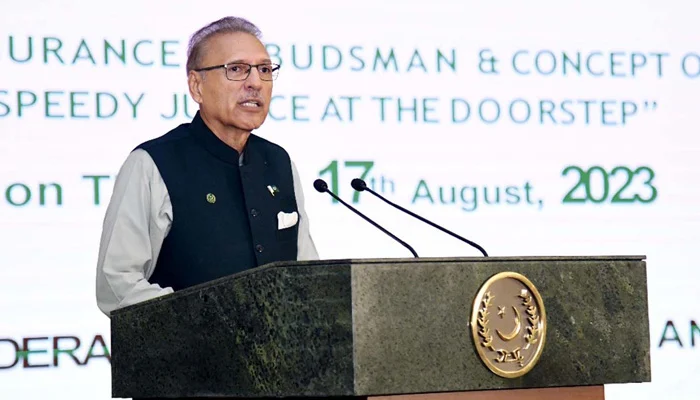President Arif Alvi on Saturday assented to Official Secrets (Amendment) Bill, 2023, and the Pakistan Army (Amendment) Bill, 2023, officially marking them as laws.
Following approval of the bills from both the Senate and National Assembly, a move that drew criticism from lawmakers belonging to both treasury and opposition benches, they were presented to the president for a final nod.
The National Assembly, on July 31, passed the Pakistan Army (Amendment) Bill, 2023, aiming to penalise individuals with a potential five-year imprisonment term for disclosing sensitive information concerning national security or the armed forces. Separately, the Official Secrets Act was greenlit just a few days before the dissolution of the National Assembly on August 7.
Both bills were finally approved by the president, too, after contentious provisions were removed by parliament due to strong objections from rights advocates and senators.
The Army Act paves the way for the punishment of up to five-year rigorous imprisonment to any person guilty of disclosing any information, acquired in an official capacity that is or may be prejudicial to the security and interest of Pakistan or the armed forces.
After misunderstandings in the media began surfacing regarding new provisions and insertions in the bill being applicable to civilians, Law Minister Senator Azam Nazeer Tarar clarified that will not be the case.
Its amendments would be applicable to serving and retired officers and personnel of the Pakistan Army, including inter alia, the power to grant commission, determine terms of conditions of service, carry out welfare activities, national development tasks and for other operational and institutional matters in the light of Supreme Court judgment.
PPP Senator Mian Raza Rabbani and Senator Mushtaq Ahmad Khan protested the passage of the bill in haste while the former also staged a walkout after it was passed by the upper house of Parliament on July 27.
The revised version of the Official Secrets Act empowers the Federal Investigation Agency (FIA) to conduct investigations against individuals suspected of violating it.
The amended bill also excludes the amendment which labelled an individual as an enemy for engaging with foreign agents.
An important insertion in the Official Secrets Act 1923 says that under this Act “the Investigation Officer shall be an officer of the FIA not below the rank of BPS-17 or equivalent and he shall be designated by Director General FIA. If Director General FIA deems necessary, he may appoint Joint Investigation Team consisting of officers of intelligence agencies as he may appoint.”
According to the bill, the JIT will complete its inquiry within 30 days. The case relating to civil espionage will be investigated by the FIA or JIT. However, according to an amendment in Clause-B of Section 12, the punishment for an offence has been reduced from 14 to 10 years.



Comments are closed.